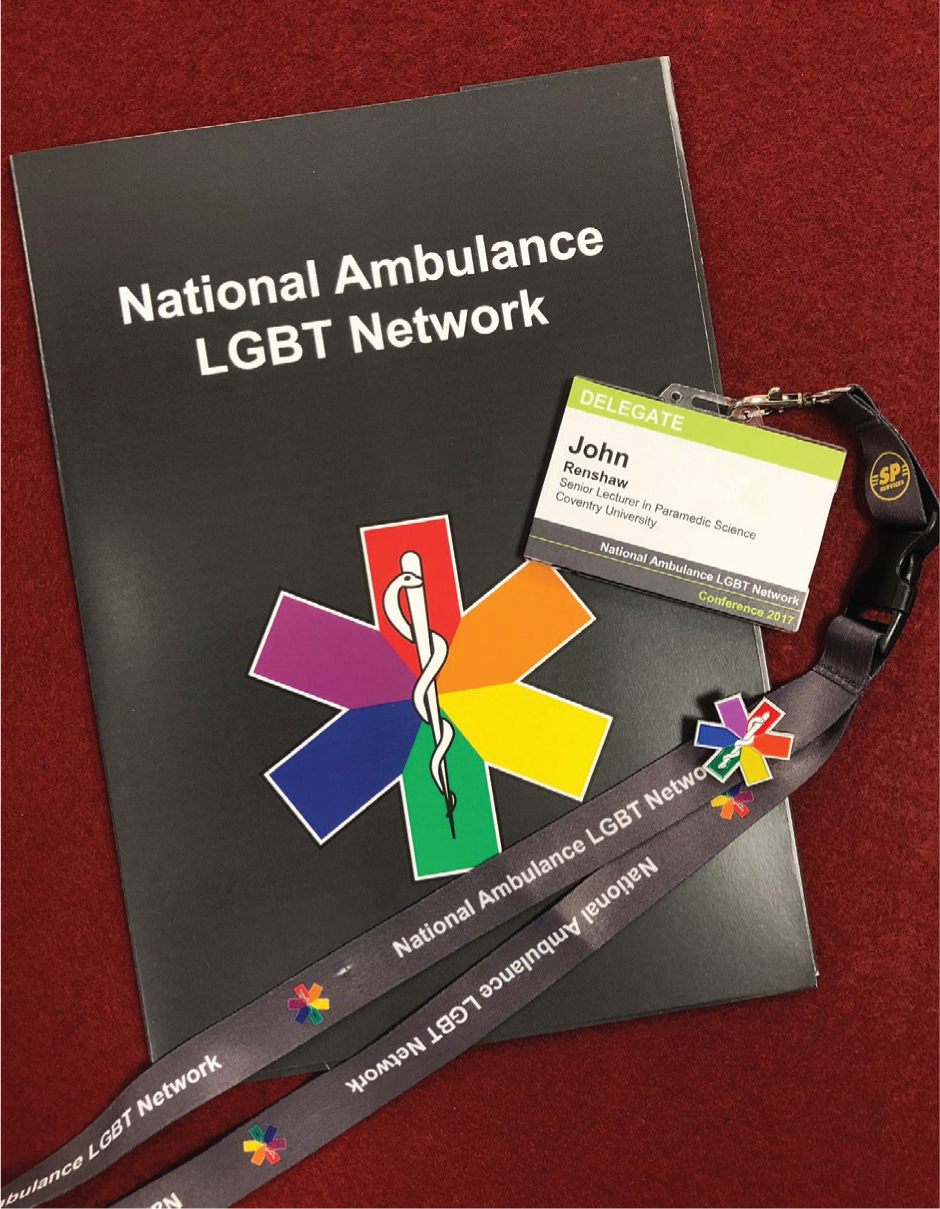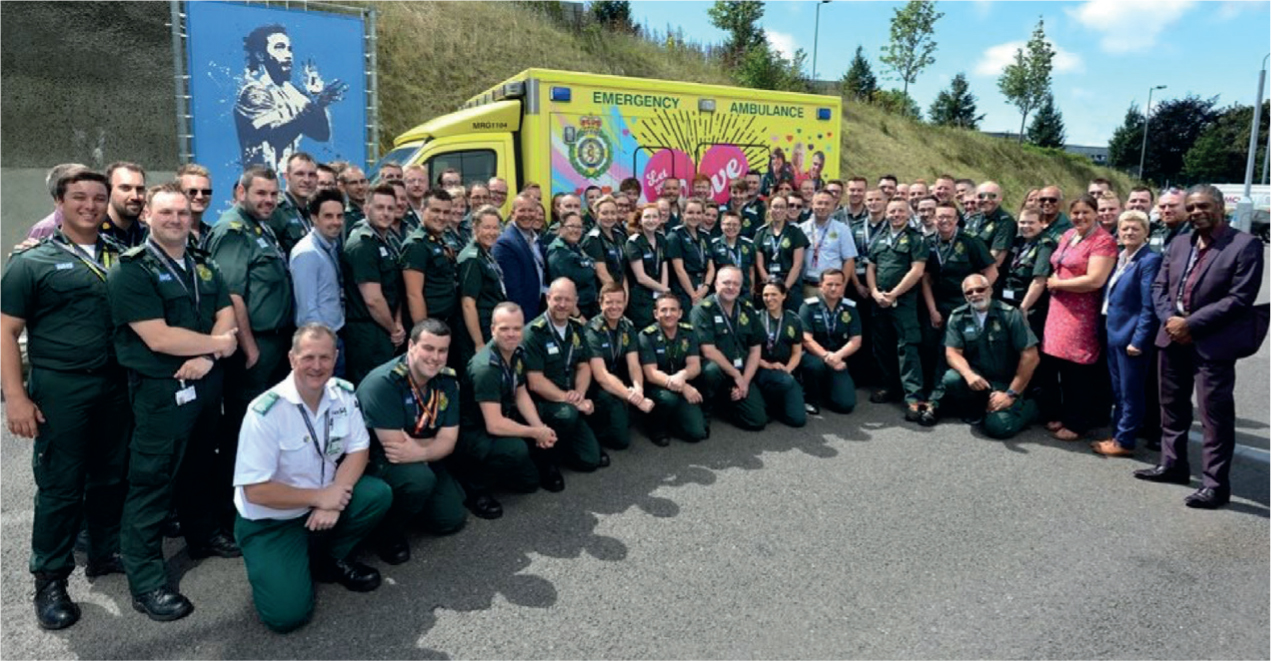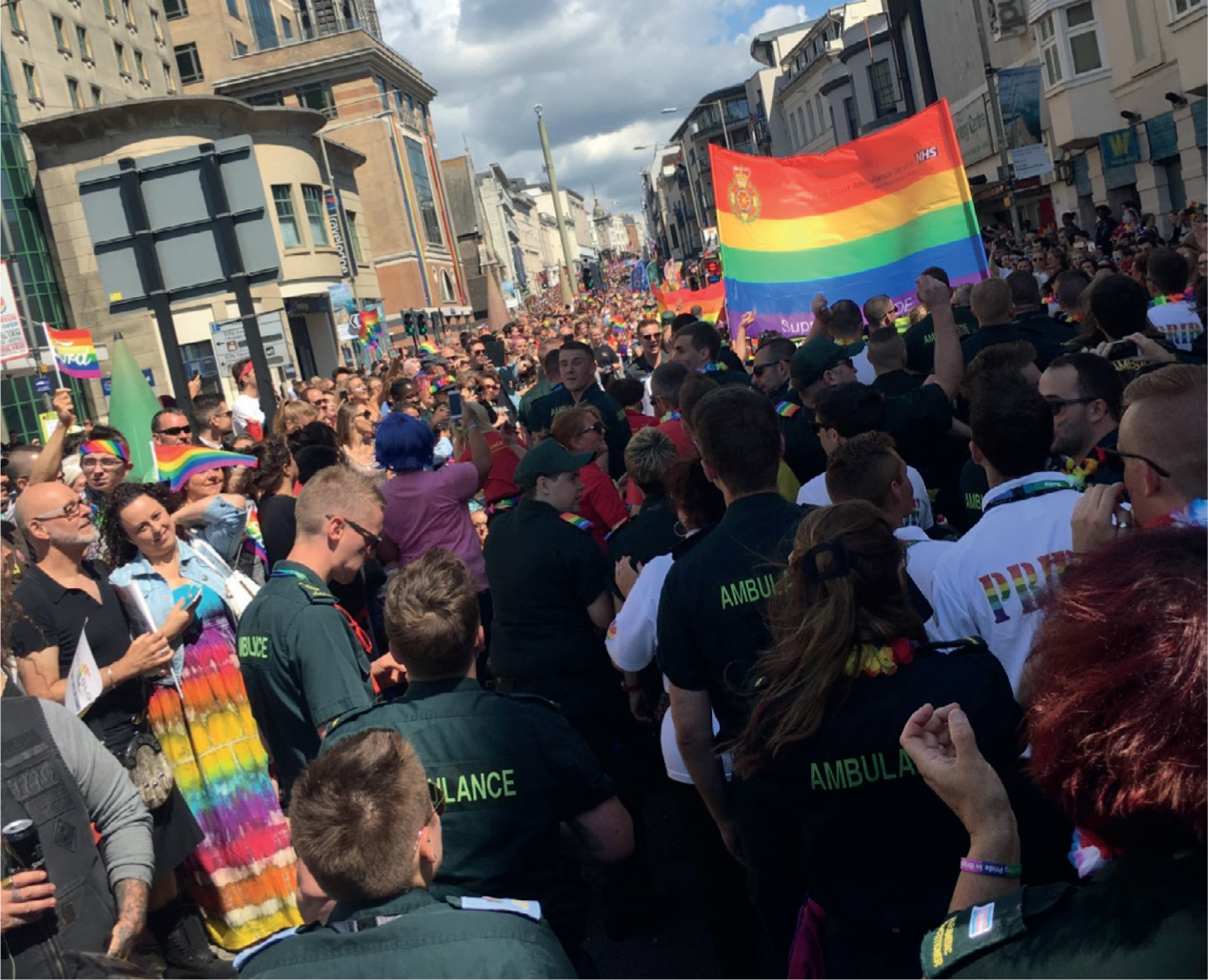In August of 2017, the National Ambulance Lesbian Gay Bisexual and Transgender (LGBT) Network held its second annual conference at the Amex Stadium in Brighton. The event gathered paramedics and ambulance staff from across the UK with additional representation from the Association of Ambulance Chief Executives (AACE), university paramedic programmes, the armed forces, and the wider private sector.
The 1-day conference explored LGBT diversity and inclusion; post-traumatic stress disorder (PTSD); transgender care; and LGBT people living with dementia. After the conference, attendees were invited to take part in the annual Brighton and Hove Pride parade alongside colleagues from South East Coast Ambulance Service NHS Foundation Trust (SECAS) which had arranged to have a visible presence in the Pride parade. This article aims to report on the success of the conference, promote the National Ambulance LGBT Network and showcase the important work being carried out to ensure LGBT inclusivity within ambulance services and the wider paramedic profession.
National Ambulance LGBT Network
The National Ambulance LGBT Network was established in 2015 to share best practices from the various regional LGBT staff networks, and provide an overview of the common issues that ambulance services encounter across the UK. The Network promptly established its terms of reference to shape the structure of the committee, and to outline the Network's shared values and goals. After an initial consultation, the committee decided that it would work towards three core objectives:
Make a difference to patient experience
The first objective of the Network is to ensure that LGBT service users receive fair treatment and have a positive experience of emergency, urgent or non-urgent care. Unfortunately, it is well known that LGBT people face discrimination when accessing health and social care, and frequently feel that their health needs are not adequately accommodated or addressed by health services (Stonewall, 2015). The Network is working hard to tackle this issue in paramedic practice and pre-hospital care through the development of support packages, educational guides and creation of a dedicated website.
Supporting our staff
Despite the significant change in legislation and attitudes towards LGBT people, there is evidence that inequality, prejudice and discrimination remain endemic within parts of society (Stonewall, 2013). The Network is aware of cases of alleged discrimination from staff working within the ambulance service and is working to raise awareness of this attitude to promote a change in culture. The Network recognises that staff who feel they have to hide their identity at work are more likely to suffer from stress and mental health issues (Stonewall, 2013).
In addition, the nature of frontline ambulance work also puts ambulance staff at an increased risk of PTSD, which further increases their vulnerability at work. These issues are avoidable and the Network intends to work with ambulance trusts to ensure they provide a workplace where people feel safe to identify as LGBT, and provide resources to identify and create appropriate interventions to support staff who feel they may have been affected by these issues.
Being visible in our communities
The Network appreciates the importance of creating a vibrant, inclusive and diverse workforce that is representative of the local communities. Therefore, it is working hard to create a visible physical presence at LGBT events, community projects, Pride events and on building a digital presence. Attendance at Pride events demonstrates a commitment to meet the specific health needs of LGBT people and promote ambulance services as inclusive employers.
Now in its third year, the Network has held two successful conferences focusing on LGBT issues in pre-hospital care, as well as regular meetings with representatives from each ambulance service within the UK, and is currently developing bespoke resources and inclusive policies and procedures, such as those supporting transgender staff, and all LGBT people. The committee has created a starter pack to help LGBT networks establish themselves; a resource designed to recognise the needs of older LGBT people using patient transport services. The committee is also working towards the publication of a guidance document to share best practice for ambulance services caring for people living with dementia. These exciting developments are as a result of feedback from members and the local ambulance networks.
Welcome to the conference
After an initial registration period, delegates were welcomed to the second National Ambulance LGBT Network conference by Daren Mochrie who is the chief executive officer (CEO) of SECAS (Mochrie, 2017). After this introduction, Tracy Myhill, the CEO of the Welsh Ambulance Service, and representative for the AACE, greeted attendees and spoke about how proud she was of the work of the Network.
Tracy champions equality, diversity and inclusion within the ambulance services in her role as chair of the National Ambulance Diversity Forum. After thanking staff for their attendance and participation in this event, Tracy discussed the importance of equality and diversity within the ambulance service (Myhill, 2017).
Thereafter, Alistair Gunn and Kirsten Willis, chair and deputy chair of the Network, then provided an overview of the Network's objectives and achievement to date before introducing the programme for the event (Figure 1) (Gunn and Willis, 2017).

Keynote speakers
The first keynote speaker at the conference was La-Chun Lindsay, the managing director of GE Aviation Wales. La-Chun spoke about the progress she had made at GE Aviation in creating a work environment that was inclusive for people who were LGBT. In her honest account, she also spoke about some specific challenges that she had faced during her career, and acknowledged her responsibility to uphold these values in countries or areas of the world that do not have the same norms, legal protection or social acceptance. She encouraged the audience to work hard, strive for success in everything they do and to be the positive change in their organisation (Lindsay, 2017).
The second keynote session was delivered by Darren Humphrey, who is a senior clinician at the organisation, March on Stress. Darren spoke about the disproportionate number of cases of suicide and attempted suicide in people who are LGBT (Humphrey, 2017). He outlined how we can help to identify people who are more likely to attempt suicide, and gave an overview of the various support packages, services and organisations that are working hard to reduce this health inequality, and support LGBT people with depression and mental health illness (Humphrey, 2017).
An innovation at this year's conference was the use of a one-man performance to introduce the subject of dementia and its impact on LGBT people. This recently established play The Purple List (Pearson, 2017) has been used as a training tool in various health, social care and emergency services. The play follows one man's journey through dementia, from diagnosis to death, from the viewpoint of his same-sex partner. The play explores the humour, love and tragedy of this lifespan while simultaneously highlighting the various ways in which LGBT people and their families can have their specific needs overlooked in health and social care.
Conference workshops
Over the course of the day, delegates were able to attend a programme of workshops that were specifically designed to promote professional development, and motivate paramedics to consider improving their professional practice and interaction with patients who are lesbian, gay, bisexual or transgender. Two of the workshops reflected upon personal experience.
The first workshop considered PTSD, while the second workshop documented the journey through gender transition. Two further workshops offered an insight into the developing strategy, Making Every Contact Count, and the Alzheimer's Society's Dementia Friendly initiative (Alzheimer's Society, 2017; Health Education England, 2017). Although these workshops were relatively short in duration, their impact was noticeable among delegates at the event, and feedback was extremely positive. The Network has carefully studied feedback in order to build upon the success of these small workshops in the development of content for the next annual conference later this year.
Brighton Pride Parade 2017
Brighton and Hove Pride parade has seen an exponential growth in recent years, making it the largest Pride event in the UK (Brighton Pride, 2017). For the second consecutive year, SECAS invited conference delegates to march alongside them in the parade. Previously, linking the conference to a social event like Pride has been popular with delegates who appreciate the opportunity to pursue professional development alongside the chance to socialise with colleagues from around the country. Importantly, most ambulance services have also realised the importance of attending to provide a visible message of inclusiveness, acceptance and inclusion for staff, local communities and service users (Figure 2). Unsurprisingly, the success and popularity of this year's Brighton Pride event was even captured on the Huffington Post (2017) website, which placed ‘dancing paramedics’ as its second place highlight of Brighton Pride parade (Figure 3).


What's next for the Network?
Following on from the success of the past 3 years, the National Ambulance LGBT Network hopes to have a greater impact on the patient experience and staff wellbeing through the development of education tools, support packages and awareness campaigns on areas that affect LGBT people. These areas have been identified through feedback from members, and align with wider healthcare initiatives and public-health campaigns. There are a number of projects currently under development, including:
In addition, planning is well underway for the Network's next annual conference that will be held at Manchester Metropolitan University on 24 August 2018—the day before the Manchester Pride event. The Network is working with the host university to explore academic accreditation for the conference to enhance the professional development opportunity.
Conclusion
The National Ambulance LGBT Network Conference 2017 provided an opportunity for ambulance staff to learn about the physical and mental health issues that disproportionately affect people who are LGBT. In addition, the conference brought people together from across the country, offering the opportunity to build a professional network. Over the next few months, the Network will be working towards launching its website to share news, information and best practice with colleagues throughout the UK. It also hopes to improve the representation of many student paramedics who are currently in training, and promote its voice within the committee.
The National Ambulance LGBT Network is extremely thankful for the continued support, dedication and commitment of its representatives, and is proud of the ongoing work that is being done in this area. The Network is already planning the next ambulance conference in 2018 and to build on last year's success.

